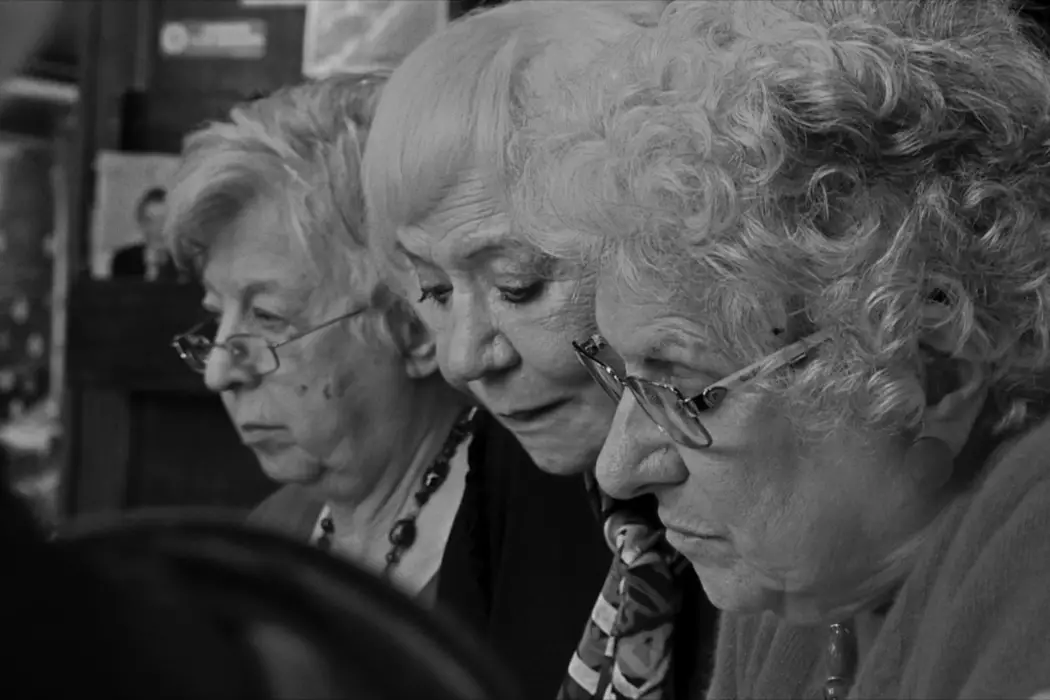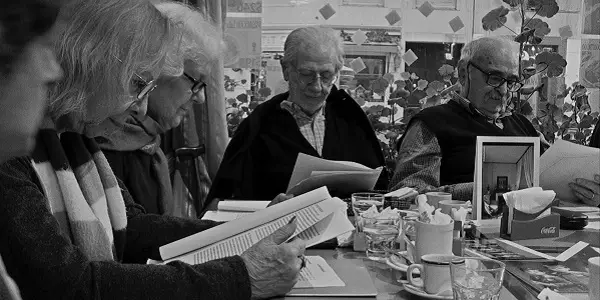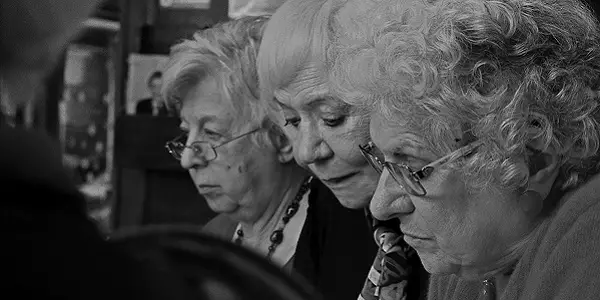LE TEMPS PERDU: In Remembrance Of Marcel Proust

Lee Jutton has directed short films starring a killer toaster,…
The second installment of filmmaker Maria Alvarez’s trilogy of documentaries about art and aging (following Las Cinéphilas and preceding Las Cercanas) could not possibly focus on a more fitting subject. In Le Temps Perdu, Alvarez eavesdrops on a group of elderly people who have been meeting together for nearly two decades in a Buenos Aires cafe to read and re-read Marcel Proust’s masterwork, In Search of Lost Time.
Published in seven volumes over the course of fourteen years, In Search of Lost Time focuses on themes of involuntary memory; the unnamed narrator tells his story through remembered experiences and lengthy contemplations, forgoing anything like a traditional plot in favor of delving deep into the most formative moments in one’s life. Rich with details about life in early 20th century Paris that often grow overwhelming (and even, in some instances, a bit boring), the novel is simultaneously epic and mundane — much like life itself. But that’s one of the reasons why so many readers — myself included — remain passionate about it to this day.
Time After Time
Le Temps Perdu of course translates to Lost Time — a perfect title for Alvarez’s documentary in numerous ways, some more bittersweet than others. Since shooting the film, the cafe that is the film’s setting has closed, effectively putting a halt to the group’s meetings and rendering Le Temps Perdu a literal depiction of times that are now lost to its characters, fated to live on only as memories.
As one of the readers featured in Le Temps Perdu notes several times throughout the film, the group was started by his daughter, whose namesake is one of the most memorable, integral characters in In Search of Lost Time: Albertine. At the time, the father was not familiar with Proust; it was the mother who decided to name their daughter after the young woman who becomes the great obsession of the novel’s narrator.

Since then, the group has met over and over again to read segments of the novel out loud and discuss what it means to them; once they finish it, they begin again. Through their endless re-reading, the novel continues to evolve even a century after Proust’s death, taking on new meanings and resonating with them differently each time as they too continue to evolve with advancing age. “This is why I keep insisting reading is a creative act… every reading is different from the one before,” one character declares.
Time Regained
Le Temps Perdu is photographed in stark black and white, with the camera often lingering on the faces of those listening as opposed to those currently speaking. In between scenes, we see sports play out on the cafe’s televisions, and tables cleaned and moved back into their original positions. This observational, almost voyeuristic camerawork, highlighting small details that you wouldn’t necessarily notice on your own but that further flesh out the world of the film in their specificity, is just another way in which Le Temps Perdu pays fitting homage to the iconic work of literature at its center.

The film was shot over four years, in which the group completes one full reading of the 4,000+ page novel. As someone who started reading In Search of Lost Time back in 2017 and still has one volume to go, I can attest that taking one’s time is the ideal way to explore and appreciate Proust’s dense, detail-heavy writing. And as someone deeply familiar with the book’s iconic characters, including the mysterious Albertine, the nouveau riche social climber Madame Verdurin, and the loyal yet judgmental family maid Francoise, listening to other readers discuss them in depth was fascinating for me personally. They grow emotional over Albertine’s tragic death, talking about her as though she were a real-life friend, and discuss how Proust’s vivid depictions of love, lust, and jealousy bring their own memories back to the forefront of their minds—much like the taste of the madeleine, dipped in tea, that famously kicks off the lengthy reverie that ends up comprising the entire novel.
However, I do find it hard to imagine anyone who has not read at least one volume of In Search of Lost Time finding the same enjoyment in Alvarez’s film that I did. Le Temps Perdu does not provide much background information on either Proust or his novel, presuming that if you’re watching this documentary, you already know enough to follow along in the group’s conversations and nod knowingly when they reference Vinteuil’s sonata or Verdurin’s salon. If you don’t, then perhaps the film will inspire you to pick up a copy of the book yourself; in my case, it wholeheartedly made me wish I too had a group to read and discuss it with. Nonetheless, Le Temps Perdu feels much more like a supplement to the novel for hardcore fans than an introduction to it for those who are merely curious.
Conclusion
In exploring how memory and creation are irrevocably entwined, Le Temps Perdu is an ideal tribute to Proust’s masterpiece and the readers who love it—but if you’re not already a fan, it may not hold the same poignancy.
What do you think? Have you read In Search of Lost Time? Share your thoughts in the comments below.
Le Temps Perdu opens at Film Forum in New York on August 12, 2022.
Watch Le Temps Perdu
Does content like this matter to you?
Become a Member and support film journalism. Unlock access to all of Film Inquiry`s great articles. Join a community of like-minded readers who are passionate about cinema - get access to our private members Network, give back to independent filmmakers, and more.
Lee Jutton has directed short films starring a killer toaster, a killer Christmas tree, and a not-killer leopard. Her writing has appeared in publications such as Film School Rejects, Bitch: A Feminist Response to Pop Culture, Bitch Flicks, TV Fanatic, and Just Press Play. When not watching, making, or writing about films, she can usually be found on Twitter obsessing over soccer, BTS, and her cat.













